Operation 1027 poses rare challenge to Myanmar junta
Share
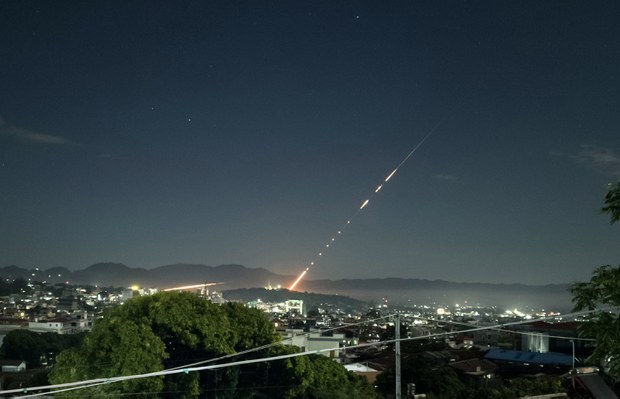
A missile fired from a Myanmar junta military base seen over Lashio township, northern Shan State on Oct. 28, 2023.
On Nov. 7, hours after a colonel who commanded a light infantry division became the senior-most Myanmar officer to die in the war to date, junta chief Min Aung Hlaing held an emergency meeting of his top military leaders to discuss the gathering offensive by the Three Brotherhood Alliance.
Speaking at an emergency meeting of the National Defense and Security Council in the capital Naypyitaw a day later, Min Aung Hlaing stressed the urgency of putting an end to the northern offensive.
“The three ethnic alliance attacks in northern Shan state near the China-Myanmar border will break the country into pieces,” he said.
The Three Brotherhood Alliance, which includes the Ta’ang National Liberation Army, (TNLA) the Myanmar National Democratic Alliance Army (MNDAA), and the Arakan Army launched Operation 1027 on Oct. 27, and have swept across northern Shan State, taking control of over 126 of the military’s forward operating bases.
Casualty figures are very hard to confirm and any claims should be taken with a large dose of salt, but Brotherhood Alliance forces now control much of Highways 3 and 34 to the key China border towns of Muse and Chinshwehaw.
One light infantry battalion (LIB) laid down their arms without putting up a fight. That in itself is very telling. On paper a LIB is supposed to be roughly 200 men per battalion, though a September 2022, order called for a floor of 185 men. The battalion that surrendered had only 41 men. Other militia forces have likewise surrendered.
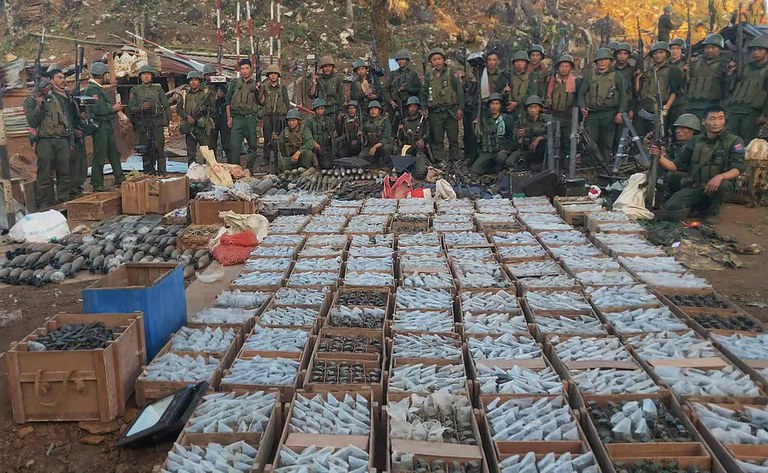

The offensive is not a total surprise. The TNLA has been fighting for most of 2023. The MNDAA had warned that they would join the TNLA should the military attack their positions in the Kokang region.
The inclusion of the Arakan Army from Rakhine state was a bigger surprise, because the group saw that they could get greater autonomy in their western state by not fighting, and reached a ceasefire in November 2022.
Operation 1027 is important for five key reasons.
First, the Brotherhood Alliance supports the opposition National Unity Government (NUG) and its goals for a federal democracy – even though to date it has not fought alongside the NUG, despite its alliance with the Kachin Independence Organization, a key member of the NUG’s multi-ethnic alliance.
The TNLA has trained NUG’s people’s defense forces (PDFs), but thus far it has only fought the military in self defense. PDFs are now fighting alongside the Brotherhood Alliance.
Junta taken by surprise
The coordinated offense has clearly taken the military by surprise. Of all the various conflict zones in the country, including Sagaing, Chin, Kachin, Mon, Tanintharyi, Shan has seen significantly less fighting. This is a new front that the military can ill afford.
Second, we are already witnessing, if not actually further coordinated offensive operations against the junta, clearly opportunistic actions by other groups.
On Nov. 6, a coordinated operation between the Kachin Independence Army, the Arakan Army and a PDF took control of Kawlin Township in Sagaing. It is the first of 330 township capitals in Myanmar to fall, and the first where the NUG flag was raised.
It remains to be seen whether the Arakan Army will break their ceasefire in Rakhine. They may feel compelled to do so if their forces in northern Shan suffer heavy casualties. But even if they don’t break the ceasefire, for the past week the military regime has been redeploying forces to Rakhine.
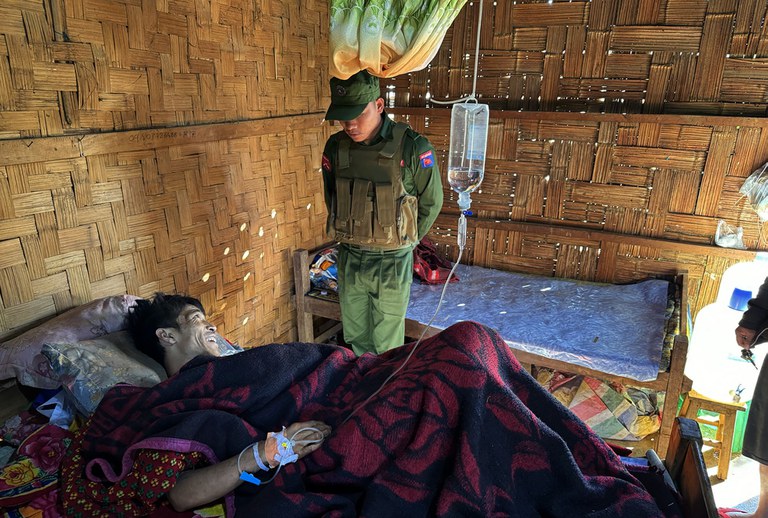

Fighting between the military and Karen National Liberation Army in the southeastern Tanintharyi region has also escalated.
Third, Beijing has sent several high level delegations to Naypyidaw to pressure the junta to resume the stalled Kyaukphyu port project and the railroad and roads that would connect it to Yunnan province under China’s Belt and Road Initiative of infrastructure lending.
Following the visit by a top Chinese diplomat, after Min Aung Hlaing was unceremoniously not invited to the Belt and Road’s 10th Anniversary summit in Beijing last month, Naypyidaw solicited tenders for the port project.
Highway 3 and 34 are the main arteries from Mandalay and Naypyitaw to China, and part of the China-Myanmar Economic Corridor. The free trade zone in Muse-Ruili is currently stalled, and China’s railroad terminates there.
Border trade with China is critically important to the junta, as dollar-denominated trade is too expensive for the sanctioned regime. And those roads are a key conduit for armament imports from China.
China’s role
Fourth, the capture of border posts ties into the broader question about China’s involvement. All three members of the Brotherhood Alliance have traditionally been dependent on China, which stepped up their pressure on them and the KIA this year to cease their military operations against the military.
China’s special representative to Myanmar has convened several meetings to pressure them to engage the junta and rejoin the peace process. While they politely refused, they also pledged to protect Chinese economic interests.
Operation 1027 clearly demonstrates their agency and willingness to resist Chinese pressure if it goes against their interests.
Fifth, upon capturing Chinshwehaw and two other cities – all havens for cyber scams, human, drug and wildlife trafficking, and illegal casinos – the MNDAA began to dismantle the criminal syndicates. Chinese have been fleeing Laukkaing, another hub of illicit activity, to escape the fighting. Radio Free Asia has reported that Thailand is trying to repatriate 162 nationals who had been trafficked to the border crime zones.
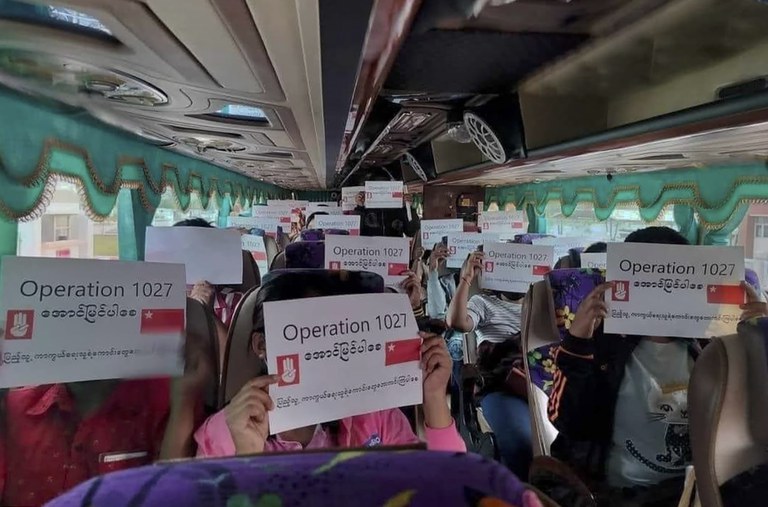

Shutting down the crime zones is a significant development in itself. But it will also impact the junta’s coffers. Most of the special economic zones are controlled by local border guards forces who are allied with the military regime. These former ethnic resistance armies accepted autonomy in return for economic concessions.
The junta is believed to get a large cut of the proceeds. But if nothing else, the loss of the criminal syndicates will dry up the funds necessary to administer the border guards forces and keep their loyalty.
The coup leader vowed to launch a counter offensive. But could he?
Video shared on social media showed a large army convoy on the outskirts of Pyin Oo Lwin in the Mandalay region, but highway 3 and 34 beyond Lashio will be well defended by the Brotherhood Alliance.
Morale on both sides
The United Wa State Army announced that they were neutral in the current conflict. While many had hoped that the Wa would join forces, their neutrality could make an army attack from the south through territory it controls difficult.
Finally, while the military is able to use helicopters to resupply forces in northern Shan, it doesn’t have sufficient airlift capacity to mount a full scale invasion. And with the loss of 126 camps and their supply of weapons and ammunition, it has few places from which to stage attacks.
If the military tries to launch a counter-offensive and fails, that will have a huge impact on morale within its ranks, and concurrently cause a huge spike in the morale of the NUG and its allies and partners, which have been suffering high rates of casualties.
It would also likely lead to more defections and desertions of soldiers and border guard units that can no longer be resupplied.
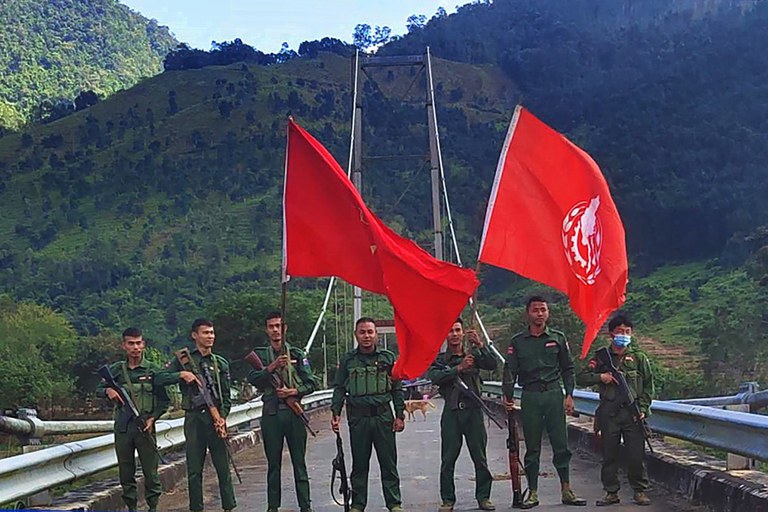

The military is likely to respond with more indiscriminate air strikes and long range artillery bombardments from a safe distance. Both will result in more civilian casualties, including in China, and refugee flows.
Rather than an offensive, we might be witnessing the buildup of troops in a defensive perimeter around Pyin Oo Lain, which is the home of the military’s once prestigious Defense Services Academy, and thus highly symbolic.
Min Aung Hlaing will search for scapegoats and purges and reshuffles will follow as the military grows desperate. Revolutions always eat their own. Will the assembled brass put Min Aung Hlaing out to pasture before he comes for them?
Zachary Abuza is a professor at the National War College in Washington and an adjunct at Georgetown University. The views expressed here are his own and do not reflect the position of the U.S. Department of Defense, the National War College, Georgetown University or Radio Free Asia.







